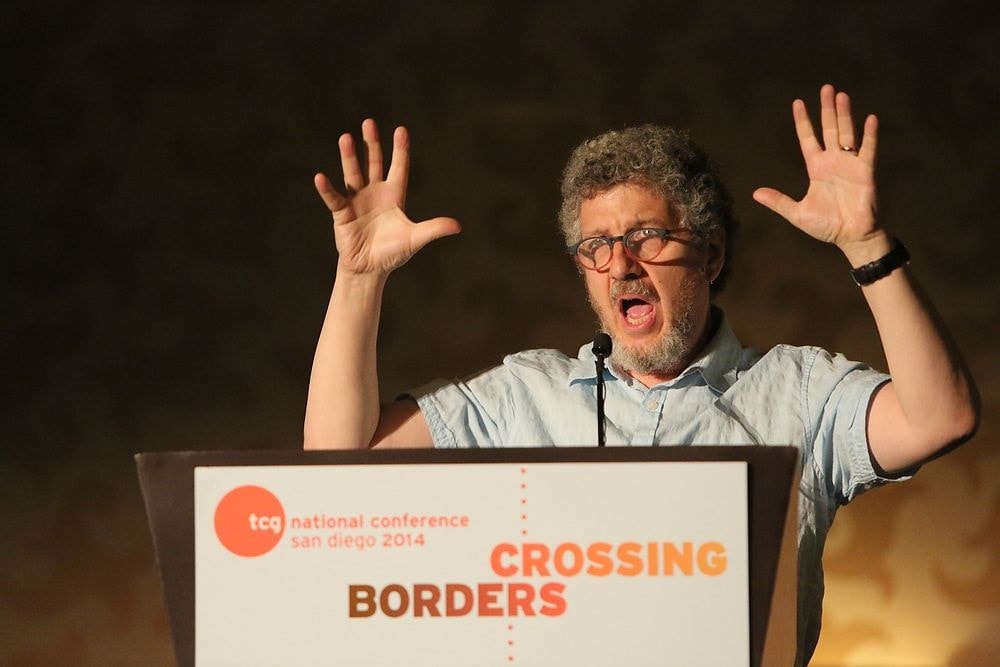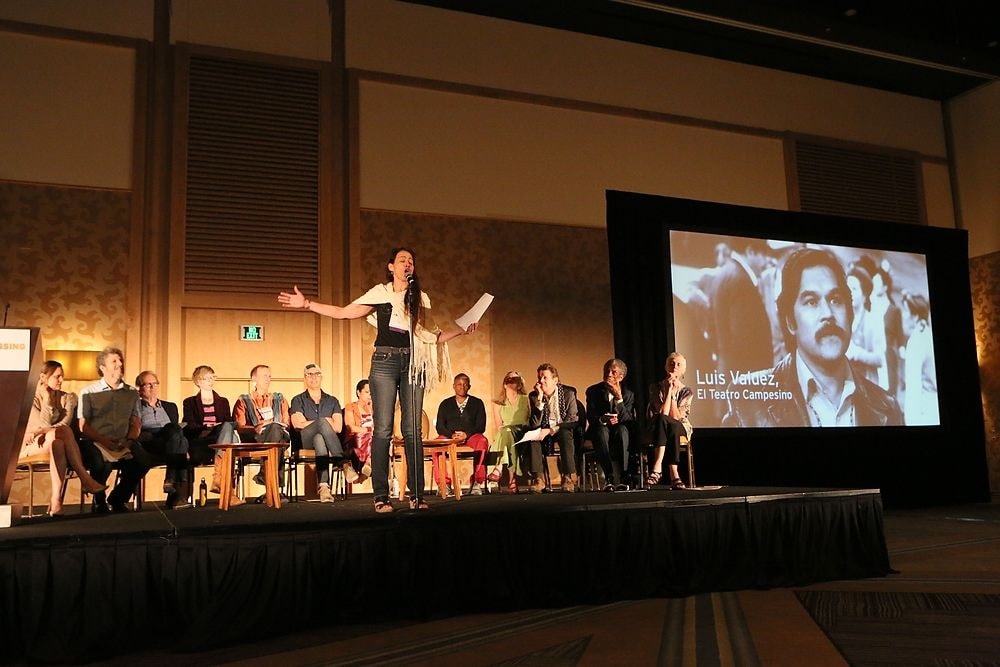From June 19–21, AT’s parent company, Theatre Communications Group, held its 24th annual national conference, titled “Crossing Borders.” Below is a recap of the closing plenary, titled “An Ideal Theatre,” on Saturday, June 21, 2014.
What a lineup! Who anticipated, going into the final plenary session of TCG’s 2014 National Conference in San Diego, that they’d be hearing commentary from the likes of Eva Le Gallienne and Herbert Blau and Ellen Stewart and Hallie Flannigan? Not in person, it goes without saying, because these particular tradition-toppling theatre figures are no longer with us. But Le Gallienne, Blau, Stewart, Flannigan and some 30 others who have indelibly changed the face of the American theatre showed up all the same, embodied, often with uncanny impact, by hand-selected conference participants. Arrayed on stage behind the session’s main speaker, Todd London, or springing unannounced out of the audience, this varied crew of 35 or so interpretive readers gamely represented the theatrical heroes who’d come before them, delivering some of those pioneers’ most eloquent and quotable thoughts to the accompaniment of a resplendent slide show of their faces in vintage black-and-white. For a theatre crowd—arguably the nation’s most illustrious and potent theatre crowd—it was emotional dynamite. You had to be there.
Those who were won’t soon forget the session’s impact. They’ll remember noisy moments, like Cal Shakes A.D. Jonathan Moscone racing through the aisles as he raucously declaimed Herb Blau’s revolutionary intent to “be incendiary and subversive, maybe even un-American,” or playwright Luis Alfaro’s fulminations in the voice of San Francisco Mime Troupe founder R.G. Davis, whose message to those allergic to theatre about social issues was “Fuck you, buddy! Theatre is a social entity.” They’ll remember quiet moments, like People’s Light A.D. Abigail Adams’s gentle articulation of Margo Jones’s famous imperative that “We must create the theatre of tomorrow today,” and Cincinnati Playhouse in the Park honcho Blake Robison’s plummy recitation of Peter Schumann’s belief in the equivalency of theatre and bread. They’ll remember Theatre Offensive executive A.D. Abe Rybeck’s earrings, glittering as he enumerated Charles Ludlam’s principles for a Theatre of the Ridiculous, and Andre De Shields’s welling of humor and emotion as he tracked young Ellen Stewart down Delancey Street in 1950s New York City.

That’s only a sampler of the session’s riches; the full serving is available, of course, in the pages of An Ideal Theater: Founding Visions for a New American Art, TCG’s landmark 2013 documentary history of the American theatre movement, assembled and edited by London, who skillfully cribbed from his magnum opus to fashion the conference’s climactic plenary. “We wanted to find a way to acknowledge both the newness and the longevity of this theatre tribe, of our roots and our branches,” London told the assembly. “As someone who alternates between enthusiasm and outrage at the American theatre, I often think my own dreams are too small. So I’ve started looking backward and forward for inspiration—backward to the people from whom we’ve inherited this field, and forward to those younger than I am, who haven’t yet hit the wall of discouragement or learned to diminish the scale of their expectations.”
Given those intentions, there could hardly have been a more powerful prelude to the session than the presentation by veteran actor/producer Robert Hooks of the TCG Theatre Practitioner Award to the legendary co-founder of the Negro Ensemble Company, playwright, actor and director Douglas Turner Ward. Hooks’s introductory reminiscences were replete with references to colleagues that stirred murmurs of admiration from the room—Poitier, Dee, Elder, Freeman, Rolle, Rashad—and Ward was greeted with a roiling ovation. Later, at the head of the parade of pioneers, actor Daniel Alexander Jones captured Ward’s characteristic wit and edginess as he delivered passages from the honoree’s game-changing 1966 New York Times essay “American Theatre: For Whites Only?”, in which Ward issued a ringing call for “the development of a permanent Negro repertory company of at least Off-Broadway size and dimension. Not in the future, but now.”
In tandem with its high-impact evocation of the aspirations of past leaders like Ward—from American Conservatory Theater’s iconoclastic William Ball, to the radicals Judith Malina and Julian Beck of the Living Theater, New Dramatists’ insightful Michaela O’Harra, workers’ rights advocate Luis Valdez of El Teatro Campesino, Group Theatre brain Harold Clurman and others—London designed the session to “attend to the future,” as well. Attendees were invited to come to a microphone and “perform a simple act: say a name. It should be the name of someone whom you believe in, someone who you believe will help build our theatre’s future.” With little hesitation, names flew into the air—some predictably familiar in the professional theatre landscape, others less so. This reporter scribbled 30 or 40 names on his pad as the call-outs multiplied, but in fact these citations are not proper journalistic fodder. Rather, they’re talismans of a sort, personal expressions of faith in an art form that depends, perhaps more radically than any other, on the initiative and interdependence of those who practice it. The names spilled into the room like seeds planted in a garden, and we will leave them there (if you’re interested, you might hear them here).
London’s plenary agenda, it must be noted, generated objections from some quarters that felt under-represented in his sweeping but time-bound enterprise, which served as the summing-up of an event that focused unrelentingly on diversity, inclusion and fairness. “At today’s closing plenary, we heard many words by some of the founders of American theatre companies. Today we didn’t hear the words by some of the founders of Asian-American theatre companies,” multidisciplinary theatre artist Alison De La Cruz posted on social media, where she offered quotations from East West Players founder Mako as a symbolic addenda to the plenary. A Latino contingent lamented that its community was also given short shrift. Cultivating and validating “a multiplicity of voices”—one of the 2014 conference’s explicit goals—remains an ongoing challenge. But the mountaintop beckons, and in all its “excitement and frustration,” as London put it, TCG ’14 was another step up the incline.


